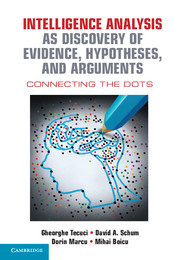Book contents
- Frontmatter
- Contents
- Preface
- Acknowledgments
- About the Authors
- 1 Intelligence Analysis: “Connecting the Dots”
- 2 Marshaling Thoughts and Evidence for Imaginative Analysis
- 3 Disciple-CD: A Cognitive Assistant for Connecting the Dots
- 4 Evidence
- 5 Divide and Conquer: A Necessary Approach to Complex Analysis
- 6 Assessing the Believability of Evidence
- 7 Chains of Custody
- 8 Recurrent Substance-Blind Combinations of Evidence
- 9 Major Sources of Uncertainty in Masses of Evidence
- 10 Assessing and Reporting Uncertainty: Some Alternative Methods
- 11 Analytic Bias
- 12 Learning and Reusing Analytic Expertise: Beyond Disciple-CD
- Glossary of Terms
- References
- Appendixes
- Index
6 - Assessing the Believability of Evidence
Published online by Cambridge University Press: 05 August 2016
- Frontmatter
- Contents
- Preface
- Acknowledgments
- About the Authors
- 1 Intelligence Analysis: “Connecting the Dots”
- 2 Marshaling Thoughts and Evidence for Imaginative Analysis
- 3 Disciple-CD: A Cognitive Assistant for Connecting the Dots
- 4 Evidence
- 5 Divide and Conquer: A Necessary Approach to Complex Analysis
- 6 Assessing the Believability of Evidence
- 7 Chains of Custody
- 8 Recurrent Substance-Blind Combinations of Evidence
- 9 Major Sources of Uncertainty in Masses of Evidence
- 10 Assessing and Reporting Uncertainty: Some Alternative Methods
- 11 Analytic Bias
- 12 Learning and Reusing Analytic Expertise: Beyond Disciple-CD
- Glossary of Terms
- References
- Appendixes
- Index
Summary
BELIEVABILITY: THE FOUNDATION OF ALL ARGUMENTS FROM EVIDENCE
The second major credential of evidence involves its believability (sometimes referred also as credibility). Suppose that an analyst is considering an item of information as possible relevant evidence. This credential involves the question, “Can we believe what this item of evidence is telling us?” Of course, this believability question involves considering the source from which this item came. The order in which we ask the relevance question, “So what?” and the believability question, “Can we believe it?” is immaterial. Which one of the relevance and believability questions we ask first will not affect our discussion of the credentials of evidence. In our view, the evidential and inferential issues surrounding believability assessment form perhaps the most difficult and interesting questions to be asked in intelligence analysis, or in any other context for that matter. One major difficulty is that we must ask different kinds of believability questions depending on the kinds of evidence we have and on the sources from which this evidence has come. In the next section, when we discuss basic substance-blind forms of evidence, we will see how various credibility questions we must ask are different for tangible items of evidence such as those provided by IMINT, COMINT, and MASINT than those provided by human informants or assets who provide testimonial evidence in the form of HUMINT. And, in the case of HUMINT, we require additional questions regarding the competence of HUMINT informants; one basic error often made in intelligence analyses is that the competence of a HUMINT source is often construed as evidence about this source's credibility. As we will show, competence does not entail credibility, nor does credibility entail competence; they are entirely separate matters.
Regardless of the form and source of the evidence being considered, we must distinguish between evidence about an event and the event itself. Having evidence about an event does not entail that this event actually occurred. To believe that an event did occur just because we have evidence for that invites all sorts of inferential troubles, primarily because sources of intelligence evidence of any kind have every possible gradation of believability shy of perfection.
- Type
- Chapter
- Information
- Intelligence Analysis as Discovery of Evidence, Hypotheses, and ArgumentsConnecting the Dots, pp. 118 - 138Publisher: Cambridge University PressPrint publication year: 2016

